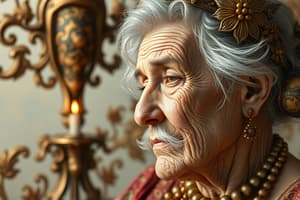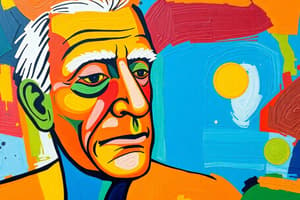Podcast
Questions and Answers
Which statement best defines successful aging?
Which statement best defines successful aging?
- High cognitive and physical functioning combined with active engagement in life. (correct)
- Absence of disease, disability, and engagement in community activities.
- Maintaining social connections and ensuring financial stability.
- Presence of advanced technology for health monitoring and management.
What defines the age classification of 'the oldest old'?
What defines the age classification of 'the oldest old'?
- Individuals aged 55 to 64 years old.
- Individuals aged 65 to 75 years old.
- Individuals over 85 years old. (correct)
- Individuals aged 75 to 85 years old.
Which factor is NOT typically associated with variations in life expectancy?
Which factor is NOT typically associated with variations in life expectancy?
- Socioeconomic status.
- Residential area.
- Access to health care.
- Frequency of family gatherings. (correct)
Which of the following theories of aging posits that human aging is programmed into the body?
Which of the following theories of aging posits that human aging is programmed into the body?
Which of the following factors may contribute to the onset of chronic diseases in the elderly?
Which of the following factors may contribute to the onset of chronic diseases in the elderly?
What role does the Endocrine Theory attribute to hormones in the aging process?
What role does the Endocrine Theory attribute to hormones in the aging process?
How does the Immunological Theory describe the aging of the immune system?
How does the Immunological Theory describe the aging of the immune system?
Which aspect does the Cross-linking Theory attribute to the process of aging?
Which aspect does the Cross-linking Theory attribute to the process of aging?
What does the Wear and Tear Theory suggest about physical systems in the body?
What does the Wear and Tear Theory suggest about physical systems in the body?
What is a common consequence of the aging process as described in the Damage or Error theories?
What is a common consequence of the aging process as described in the Damage or Error theories?
What consequence stems from the accumulation of cross-links in proteins and DNA over time?
What consequence stems from the accumulation of cross-links in proteins and DNA over time?
What is the main role of superoxide dismutase (SOD) in the body's defense system?
What is the main role of superoxide dismutase (SOD) in the body's defense system?
Which theory of aging posits that aging results from the sequential activation of specific genes?
Which theory of aging posits that aging results from the sequential activation of specific genes?
What type of damage do free radicals primarily inflict on cellular structures?
What type of damage do free radicals primarily inflict on cellular structures?
Which of the following is NOT considered a dietary antioxidant?
Which of the following is NOT considered a dietary antioxidant?
What is the primary focus of geriatric medicine?
What is the primary focus of geriatric medicine?
Which statement accurately describes aging?
Which statement accurately describes aging?
What distinguishes gerontology from geriatrics?
What distinguishes gerontology from geriatrics?
How is successful aging defined in contrast to optimal aging?
How is successful aging defined in contrast to optimal aging?
Which of the following statements about the aging process is correct?
Which of the following statements about the aging process is correct?
Flashcards
Geriatrics
Geriatrics
A branch of medicine focused on medical issues and care for older people. It investigates diseases in older adults and their treatments.
Gerontology
Gerontology
The scientific study of the aging process, including physical, mental, and psychological changes. It investigates the impact of aging on society.
Aging
Aging
The gradual decline and deterioration of functions at various levels, leading to reduced adaptability and increased vulnerability to disease.
Successful Aging
Successful Aging
Signup and view all the flashcards
Optimal Aging
Optimal Aging
Signup and view all the flashcards
Young-Old
Young-Old
Signup and view all the flashcards
Middle-Old / Old-Old
Middle-Old / Old-Old
Signup and view all the flashcards
Oldest Old
Oldest Old
Signup and view all the flashcards
Theories of Aging
Theories of Aging
Signup and view all the flashcards
Programmed Theory of Aging
Programmed Theory of Aging
Signup and view all the flashcards
Endocrine Theory
Endocrine Theory
Signup and view all the flashcards
Immunological Theory
Immunological Theory
Signup and view all the flashcards
Damage or Error Theories
Damage or Error Theories
Signup and view all the flashcards
Wear and Tear Theory
Wear and Tear Theory
Signup and view all the flashcards
Cross-linking Theory
Cross-linking Theory
Signup and view all the flashcards
Genetic Theory of Aging
Genetic Theory of Aging
Signup and view all the flashcards
Free Radical Theory of Aging
Free Radical Theory of Aging
Signup and view all the flashcards
What are Free Radicals?
What are Free Radicals?
Signup and view all the flashcards
Body's Defense Against Free Radicals
Body's Defense Against Free Radicals
Signup and view all the flashcards
Study Notes
Geriatric (Ph.Th.) Rehabilitation
- Geriatric physical therapy focuses on the medical problems and care of older adults.
- Gerontology is the scientific study of the aging process.
- Aging involves a progressive decline in functional properties at cellular, tissue, and organ levels.
- Aging results in loss of adaptability to internal/external stimuli and an increased risk of disease.
- The rate of aging varies between people but is an inevitable part of life.
- Aging is a predictable process of gradual changes that occur over time, not necessarily due to disease.
- Aging starts at conception and is the passage of time.
Objectives
- Students will define aging, geriatrics, and gerontology.
- Students will identify and describe different theories of aging.
- Students will understand the classification of old age.
- Students will differentiate between successful and optimal aging.
- Students will understand the role of a geriatric physical therapist.
Introduction
- Geriatrics focuses on the medical problems and care of the elderly, including disease study and treatment.
- Gerontology is the scientific study of the process and problems associated with aging (physical, mental, and psychological changes) and its impact on society.
Aging
- Aging is a progressive decline and deterioration of functional properties at the cellular, tissue, and organ levels.
- This leads to a loss or decreased ability to adapt to internal or external stimuli, increasing vulnerability to disease.
- Total body decline is inevitable for everyone.
- Aging is not caused by disease or accident.
- Aging is a progressive, predictable process with gradual changes over time.
- No two people age identically.
Classifications of Old Age
- Young-old: individuals between 65 and 75 years old.
- Middle-old (the old-old): individuals between 75 and 85 years old.
- Oldest-old: individuals over 85 years old.
- The oldest-old often have the highest rates of chronic diseases, physical disabilities, hospitalization, and institutionalization.
Definitions of Life Span
- Life span is the average or maximum length of time an organism can survive.
- Life expectancy varies due to public health, nutrition, ethnicity, and gender.
- Factors influencing life span include genetics, exercise, smoking, drug/alcohol use, poverty, air pollution, occupation, diet, and access to healthcare.
Theories of Aging
- Modern biological theories of aging fall into two main categories: programmed and damage/error theories.
Programmed Theories
- These theories suggest that aging is predetermined and follows a biological timeline.
- One theory suggests that aging is a continuation of the process that regulates childhood growth and development, influenced by gene expression affecting maintenance, repair, and defense responses.
- Two subcategories are endocrine theory (hormonal regulation of cellular senescence) and immunological theory (declining immune system leading to increased disease vulnerability).
Damage/Error Theories
- These theories suggest that aging results from environmental damage accumulating over time, leading to cell and possibly organism death. A sub-category includes wear-and-tear theory (parts of the body wearing out) and cross-linking theory (mis-synthesised proteins causing cellular damage).
4 - Generation of Free Radicals Theory
- Free radicals cause damage to the macromolecular components of cells, potentially leading to accumulated damage and causing cells, and progressively organs, to stop functioning.
- The macromolecules (nucleic acids, lipids, sugars, proteins) are susceptible to free radical attack
Free Radicals (oxidative damage)
- Free radicals are atoms containing unpaired electrons constantly searching for a stable electron to become stable.
- This process damages DNA and other cellular components, potentially contributing to cancer and other diseases, and accelerating the aging process.
- The oxygen free radical attacks the structure of cell membranes, including DNA, RNA, proteins, and the lipids in the cell membrane
Defenses Against Oxidative Damage
- The body has a multi-layered defense system to detoxify damaging radicals
- Defenses include natural antioxidants (bilirubin), enzymes (superoxide dismutase, catalase, and glutathione peroxidase), and dietary antioxidants (beta-carotene, vitamin C, and E).
Rate of Living Theory
- This theory suggests that organisms have a finite number of physiological processes (like breaths or heartbeats) and death occurs when those processes are depleted.
- Basal metabolism rate is related to the life span of an organism. This is generally true, but not a complete explanation.
Membrane Theory of Aging
- Cell membrane changes over time.
- A decrease in lipid and an increase in solid components, impair the transfer of necessary chemical, heat, and electrical processes/components.
- This impairment results in a decline in cellular efficiency and sodium/potassium transfer.
Mitochondrial Decline Theory
- Mitochondria (cell powerhouses) produce ATP.
- Damage to mitochondria and mitochondrial DNA (mtDNA) contributes to the aging process.
Successful vs. Optimal Aging
- Successful aging involves: avoiding disease and disability, maintaining high physical and cognitive function, maintaining engagement in social and productive activities.
Role of Geriatric Physical Therapist
- The physical therapist assists in maintaining and enhancing the physical and physiological capacities of different body systems.
- The physical therapist aims to restore function and independence for individuals with chronic diseases, thus leading to optimal aging.
Studying That Suits You
Use AI to generate personalized quizzes and flashcards to suit your learning preferences.
Related Documents
Description
Test your understanding of successful aging and the various theories related to the aging process. This quiz covers key concepts, factors affecting life expectancy, and the classifications of older adults. Dive deep into the scientific perspectives on how we age and what defines healthy aging.




